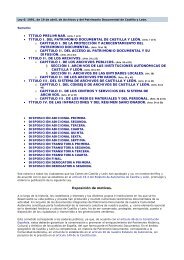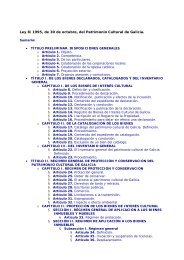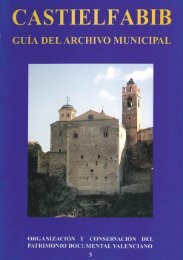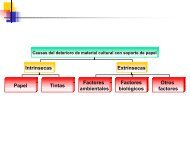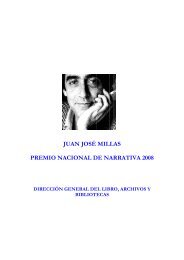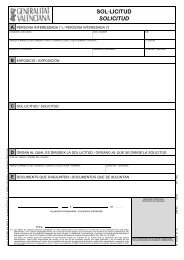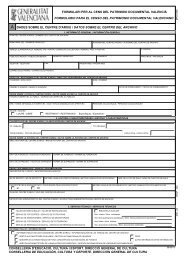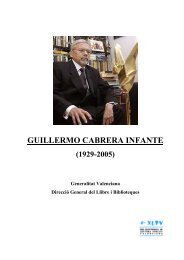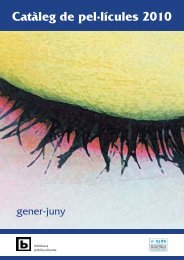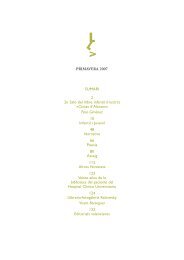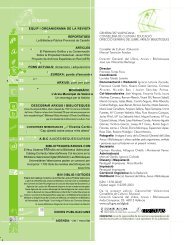Listening to the Past, Speaking to the Future
Listening to the Past, Speaking to the Future
Listening to the Past, Speaking to the Future
- No tags were found...
Create successful ePaper yourself
Turn your PDF publications into a flip-book with our unique Google optimized e-Paper software.
28working with <strong>the</strong> real materials cannot be underestimated,and can potentially be provided through <strong>the</strong> existingnetwork of local authority archives. Specialist reposi<strong>to</strong>riesare also well placed <strong>to</strong> provide diverse content for teachingmaterials <strong>to</strong> engage teachers and <strong>the</strong>reby young users.Innovative content and projects are already being deliveredby a number of archive services through <strong>the</strong> provision ofin-service training, teachers’ packs, homework clubs,outreach activities, targeted projects and visits. Building onthis investment and releasing <strong>the</strong> learning potential of <strong>the</strong>UK’s archives will require advocating <strong>the</strong> role of archivesin teaching programmes with educa<strong>to</strong>rs and teachers.Engaging teachers and lecturers in <strong>the</strong> selection andinterpretation process provides opportunities for continuingprofessional development. Raising awareness of archivesas a teaching <strong>to</strong>ol <strong>to</strong> trainee teachers is crucial, as isestablishing partnerships with schools and o<strong>the</strong>rinstitutions in order <strong>to</strong> trial resource packs and teachingsessions. To maximise <strong>the</strong> learning and education potentialof archives will require <strong>the</strong> establishment of a programmeof advocacy, information and training <strong>to</strong> raise awarenessamong teaching staff of <strong>the</strong> potential of archival material<strong>to</strong> support <strong>the</strong> curriculum.A community archives service should be focused verystrongly around community use and identity as well asindividual users and lifelong learning. It will become amajor vehicle <strong>to</strong> push forward <strong>the</strong> part that archives canplay in promoting social inclusion, citizenship and socialjustice by using <strong>the</strong> examples in archives <strong>to</strong> illuminatecontemporary issues. It will be a place where keepers andmanagers of community-based collections of documents,pho<strong>to</strong>graphs, and moving image and sound recordingsdraw attention <strong>to</strong> <strong>the</strong>ir archives and where users will beable <strong>to</strong> search through linked and cross-related contentsets. Interactive facilities will guide and help people <strong>to</strong>record <strong>the</strong>ir s<strong>to</strong>ries and memories. Those interested in <strong>the</strong>archives of particular communities will find <strong>the</strong>m allelectronically co-located. The Task Force wishes <strong>to</strong> engagewith grassroots his<strong>to</strong>ry and its under-resourcing byinviting those involved <strong>to</strong> share <strong>the</strong>ir experiences, <strong>the</strong>irenthusiasms, <strong>the</strong>ir his<strong>to</strong>ries and <strong>the</strong> digitised conten<strong>to</strong>f <strong>the</strong>ir collections in community archives.Commanet, <strong>the</strong> community archive network serves as a recordof cultural his<strong>to</strong>ry. Pho<strong>to</strong>: Batley Community ArchiveEngaging Creative CommunitiesCommanet was set up in 2000 <strong>to</strong> enable communities <strong>to</strong>create <strong>the</strong>ir own archives and publish <strong>the</strong>se in digital form.Using basic IT equipment and COMMA, an easy-<strong>to</strong>-usesoftware package, groups can digitise and s<strong>to</strong>repho<strong>to</strong>graphic and video images, text and oral narratives.These databases are published in CD-ROM and on<strong>the</strong> Commanet website (www.commanet.org). More than200 projects are underway in <strong>the</strong> UK, mostly fundedthrough <strong>the</strong> Lottery Awards for All scheme and basedin community centres, schools, libraries and museums.These projects are successful both in terms ofsustainability and in attracting people who might notusually get involved with formal cultural institutions.The idea for COMMA and Commanet grew out of a localhis<strong>to</strong>ry project in Batley, West Yorkshire, where teacherChris Levack assembled a pho<strong>to</strong>copy archive of 5,000family pho<strong>to</strong>s brought in by local people. COMMA softwarewas developed by Polkaville, a local software co-operative.Public bodies are increasingly using community archives<strong>to</strong> engage with local communities. Examples includeprojects run by <strong>the</strong> Children’s Society, <strong>the</strong> National RailwayMuseum, Norfolk Adult Education Department andCHIN (Canadian Heritage Information Network). Despiteits success, Commanet remains a voluntary organisation,run by a small core team with no direct public funding.



